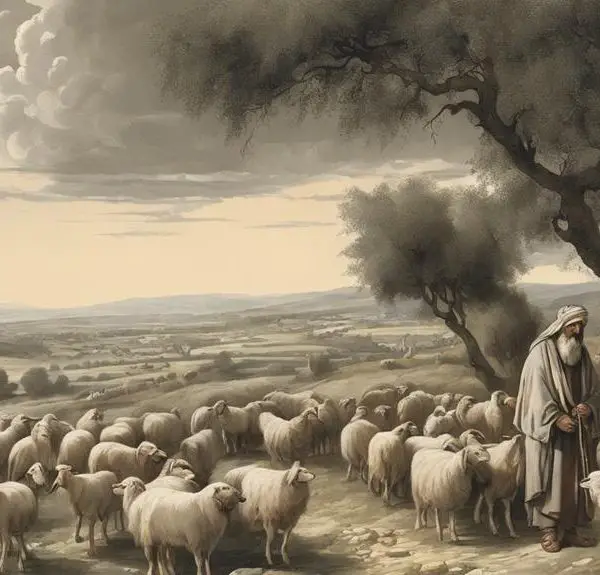Seek the enigmatic identity of Dominus in the Bible and uncover hidden layers of divine representation and theological significance.

Who Is Dominus in the Bible
Have you ever wondered who Dominus truly is in the biblical context? You're not alone. This term, Latin for 'Lord,' carries significant weight and complexity across the scriptures.
From its origins to its varied appearances in the Old and New Testaments, understanding Dominus can offer profound insights into the theological implications and personal reflections it invokes.
As you explore this intriguing topic, you'll uncover layers of meaning that might just reshape your perception of divinity and its representation in biblical texts.
So, why not embark on this journey to unravel the mystery behind Dominus?
Key Takeaways
- Dominus signifies 'Lord' or 'Master', reflecting divine authority and reverence in biblical contexts.
- In the New Testament, Dominus is translated as 'Kyrios', emphasizing Jesus's divine lordship.
- The term enriches theological discussions on God's kingship and the personal relationship with the divine.
- Dominus underscores Christ's supreme authority, shaping Christian ethical conduct and spiritual perspectives.
The Origin of Dominus

The term 'Dominus,' rooted in Latin, signifies 'Lord' or 'Master' and emerges as a pivotal title used in the context of the Bible to denote divine authority and reverence. This Latin meaning not only conveys the notion of sovereignty but also imparts a sense of ultimate control and leadership, inherently suggesting an unequal relationship between the dominus and their subjects.
In exploring the cultural interpretations of 'Dominus,' you'll find that its application and significance can vary greatly across different societies and historical periods.
In the Roman Empire, 'Dominus' was a term reserved for emperors and deities, accentuating their supreme status over the populace. This historical usage imbues the term with a profound sense of power and divinity, which is then seamlessly woven into the biblical narrative to underscore the unparalleled sovereignty of God. The adoption of 'Dominus' within Christian theology not only reflects the linguistic and cultural interplay of the ancient world but also serves to elevate the concept of God's lordship to one of absolute authority and benevolence.
As you delve deeper into the origins of 'Dominus,' it becomes evident that its significance is deeply entrenched in the nuances of language and the socio-political fabric of the times, offering a rich tapestry of cultural interpretations that enhance its meaning within the biblical discourse.
Dominus in Old Testament

Exploring how 'Dominus' is manifested within the Old Testament reveals its pivotal role in shaping the understanding of divine authority and lordship in ancient biblical contexts. The term itself, though Latin, is crucial in understanding the translation and interpretation practices of ancient texts, particularly when considering how divine titles are expressed.
- In Ancient Translations: 'Dominus' serves as a key term in the Latin Vulgate, an ancient translation of the Bible. Its usage as a translation for Hebrew titles conveys a sense of sovereignty and lordship, underscoring the monotheistic essence of the Old Testament.
- As a Divine Title: The term encapsulates a range of divine titles in the Old Testament, signifying power, authority, and a personal relationship between God and His people.
- In Literary Contexts: Its frequent appearance in psalms and prophetic books highlights the multifaceted nature of God's dominion, from creator to protector and judge.
- In Theological Discourse: 'Dominus' enriches theological discussions around the nature of God's kingship and His covenantal relationship with Israel, offering a nuanced understanding of divine lordship.
Through these perspectives, 'Dominus' in the Old Testament serves not just as a title, but as a lens through which the ancient and enduring conception of divine authority unfolds.
Dominus in New Testament

While 'Dominus' plays a pivotal role in the Old Testament, its significance is equally profound in the New Testament, where it illuminates the nature of Jesus's lordship and divine authority. The term 'Dominus' finds its Greek translation in the New Testament as "Kyrios," signifying lord or master. This Greek translation carries substantial cultural significance, echoing the divine and sovereign connotations of 'Dominus' from the Hebrew scriptures.
To understand the multifaceted role of 'Dominus' in the New Testament, it's crucial to examine its application and implications:
Aspect |
Description |
|---|---|
Usage |
'Dominus' is often used to refer to Jesus, establishing His divine authority and lordship. |
Cultural Context |
Reflects the Roman and Jewish contexts of authority, emphasizing Jesus's position above all. |
Translation Impact |
The Greek 'Kyrios' reinforces the concept of Jesus as sovereign lord, bridging cultural boundaries. |
Narrative Role |
Serves to highlight Jesus's divine role in fulfilling Old Testament prophecies. |
This analysis reveals how 'Dominus' in the New Testament not only affirms Jesus's divine authority but also bridges the Hebrew scriptures with the Greek-speaking Christian community, underscoring the universal lordship of Jesus.
Theological Implications

Understanding the role of 'Dominus' in the New Testament sets the stage for examining its profound theological implications on Christian doctrine and belief.
The term 'Dominus', Latin for 'Lord', carries deep symbolism and has evolved in its contemporary relevance. Here are the ways in which it impacts theological understanding:
- Authority of Christ: Dominus symbolism underscores the supreme authority of Christ over the church and the cosmos. This hierarchical position influences Christian practices and the acknowledgment of Jesus' sovereignty.
- Relationship with God: The usage of Dominus in prayers and liturgy emphasizes a personal and communal relationship with God. It serves as a constant reminder of the believer's dedication to serving the Lord.
- Ethical Conduct: Recognizing Jesus as Dominus shapes ethical behavior among Christians. It prompts a lifestyle that aligns with the teachings of Christ, fostering a community that upholds values of love, compassion, and justice.
- Eschatological Hope: In theological discussions, Dominus also points to the eschatological hope in Christ's second coming. This anticipation influences Christian perspectives on life, death, and the hereafter, reinforcing a faith in divine justice and eternal life.
Personal Reflections on Dominus

Reflecting on the concept of Dominus brings to light the personal dimensions of faith and devotion that it heralds for believers. This exploration isn't merely an academic exercise but a journey into the heart of what it means to connect spiritually in a modern context. The term, traditionally signifying 'Lord' or 'Master' within the biblical framework, invites contemporary followers to delve into the nature of their spiritual connections, urging a reconsideration of how ancient texts intersect with current beliefs and practices.
Modern interpretations of Dominus don't merely echo past understandings but evolve with the times, melding historical reverence with the immediacy of today's spiritual quests. This dynamism challenges you to reflect on your relationship with the Divine, pushing beyond the boundaries of traditional exegesis. It's about uncovering the layers of meaning that Dominus holds within a personal faith journey, recognizing its role not just as a title, but as a living, breathing manifestation of divine presence in daily life.
Thus, the reflection on Dominus transcends a simple recitation of its historical significance, engaging with how it shapes and is reshaped by individual spiritual journeys in the contemporary world.
Frequently Asked Questions
How Has the Interpretation of "Dominus" Evolved in Different Christian Denominations Over the Centuries?
You'll find that the interpretation of 'dominus' has shifted significantly across Christian denominations through the centuries, rooted in theological debates and varying dominus origins. These discussions have profoundly influenced how different faith communities understand and use the term, reflecting broader doctrinal evolutions.
As denominations explored and debated its meanings, 'dominus' has become a lens through which the nature of authority and divinity within Christianity is viewed, showcasing the dynamic nature of theological interpretation.
Are There Any Major Artworks or Literary Works That Have Been Significantly Influenced by the Concept of Dominus in the Bible?
Absolutely, there are numerous artistic representations and literary adaptations significantly influenced by the concept you're asking about.
From Michelangelo's frescoes in the Sistine Chapel to Dante's 'Divine Comedy,' the impact is profound and varied. These works not only capture the essence but also interpret and question the underlying meanings, offering new perspectives.
Their enduring appeal highlights their deep connection to human spirituality and the ongoing dialogue with the divine.
How Do Non-Christian Religions and Belief Systems View or Interpret the Concept of Dominus as Presented in the Bible?
You'll find that non-Christian religions, like Islam and Hinduism, offer unique takes on the concept of dominus. Islamic perspectives may parallel dominus with Allah's sovereignty, emphasizing unity and submission to one God.
Meanwhile, Hindu interpretations mightn't directly correlate but can appreciate the thematic essence of divine leadership and guidance through their myriad deities. Each tradition, in its way, sifts through the layers of dominus, adapting its core lessons to fit their spiritual frameworks.
Can the Influence of the Concept of Dominus Be Seen in Modern Legal or Political Systems, and if So, How?
You can certainly see the influence of dominus in modern legal and political systems. Legal precedents often echo the concept's authoritative principles, shaping the foundation and enforcement of laws.
Similarly, political ideologies have absorbed elements, molding governance and leadership styles. This adoption reflects in the hierarchical structures and the exercise of power, illustrating how ancient notions continue to impact contemporary societal frameworks and authority dynamics.
What Are Some Common Misconceptions About the Identity and Role of Dominus That Have Been Debunked by Biblical Scholars?
You might think Dominus simply means 'lord' or 'master,' but biblical scholars have shown it's deeper than that. The etymology ties to cultural symbolism, blending notions of authority and divinity.
Common misconceptions? That Dominus refers to a singular, supreme entity. Actually, its application varies, reflecting diverse roles and hierarchies.
This analysis not only clarifies misunderstandings but also enriches our understanding of ancient texts' complexity and their influence on modern thought.
Conclusion
In conclusion, you've explored the significance of 'Dominus' across biblical texts, uncovering its roots and presence in both the Old and New Testaments. This term not only denotes lordship but also encapsulates a profound theological depth, reflecting on the divine authority and relationship with humanity.
Through this analysis, you've gained insights into the multifaceted dimensions of 'Dominus,' enriching your understanding of its spiritual and historical relevance. This exploration invites further reflection on its implications in contemporary faith practices.



Sign up